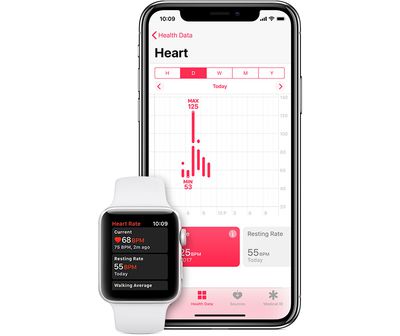Tim Cook Shares Lifesaving Apple Watch Story After Teen Goes Into Kidney Failure
A recent study claimed that the Apple Watch can detect abnormal heart rhythms with 97 percent accuracy, and today Apple CEO Tim Cook shared a new story in which the company's wearable device did just that, saving someone's life in the process.
Speaking with Tampa, Florida's ABC affiliate WFTS, 18-year-old Deanna Recktenwald said that one day her Apple Watch warned her that her resting heart rate hit 190 beats per minute. After staff at a walk-in clinic confirmed a similar heart rate, Deanna was sent to the emergency room where doctors found that she was in kidney failure.

Deanna's parents gifted her the Apple Watch for Christmas last year, with the family now thankful for its ability to alert them to a condition that might have otherwise continued to go unnoticed. "Now that we have some answers to why this is happening we can prevent something major from happening down the road," said Deanna.
Deanna's mother Stacey wrote to Apple, explaining what happened and thanking the company for the Apple Watch.
"After about an hour the blood work came back and the doctors reviewed the results and told us that Deanna was in Kidney Failure. Her kidneys were only functioning at 20%. She had no symptoms of any kidney issues or any other medical issues. If it wasn't for her Apple watch alarming her about her HR we wouldn't have discovered her kidney issue.
I honestly feel that your Apple Watch has saved my daughter's life. She is heading off for college in August and her condition may have been overlooked and if it wasn't caught now the doctor said she would have needed a kidney transplant. I am forever grateful to Apple for developing such an amazing lifesaving product. Now I can send her off to college and know that she can monitor her HR and seek attention if it alarms her again.
Tim Cook responded to Stacey in an email, and this morning tweeted about the event. "Stories like Deanna's inspire us to dream bigger and push harder every day," Cook's tweet reads. Apple has even teamed up with Stanford for its own study on whether the Apple Watch can detect abnormal heart rhythms and other common heart problems.
In addition to Cardiogram's study on abnormal heart rhythms, a study published by the company late last year reported that the Apple Watch may be able to accurately detect hypertension and sleep apnea. The study found that Cardiogram's deep neural network was able to recognize hypertension (aka high blood pressure) with 82 percent accuracy and sleep apnea with 90 percent accuracy. In 2018, Cardiogram's latest study suggested the Apple Watch can be used to detect the signs of diabetes.
Popular Stories
Apple's next-generation iPhone 17 Pro and iPhone 17 Pro Max are less than three months away, and there are plenty of rumors about the devices.
Apple is expected to launch the iPhone 17, iPhone 17 Air, iPhone 17 Pro, and iPhone 17 Pro Max in September this year.
Below, we recap key changes rumored for the iPhone 17 Pro models:Aluminum frame: iPhone 17 Pro models are rumored to have an...
The long wait for an Apple Watch Ultra 3 appears to be nearly over, and it is rumored to feature both satellite connectivity and 5G support.
Apple Watch Ultra's existing Night Mode
In his latest Power On newsletter, Bloomberg's Mark Gurman said that the Apple Watch Ultra 3 is on track to launch this year with "significant" new features, including satellite connectivity, which would let you...
The upcoming iPhone 17 Pro and iPhone 17 Pro Max are rumored to have a slightly different MagSafe magnet layout compared to existing iPhone models, and a leaked photo has offered a closer look at the supposed new design.
The leaker Majin Bu today shared a photo of alleged MagSafe magnet arrays for third-party iPhone 17 Pro cases. On existing iPhone models with MagSafe, the magnets form a...
Apple is developing a MacBook with the A18 Pro chip, according to findings in backend code uncovered by MacRumors.
Earlier today, Apple analyst Ming-Chi Kuo reported that Apple is planning to launch a low-cost MacBook powered by an iPhone chip. The machine is expected to feature a 13-inch display, the A18 Pro chip, and color options that include silver, blue, pink, and yellow.
MacRumors...
Apple is planning to launch a low-cost MacBook powered by an iPhone chip, according to Apple analyst Ming-Chi Kuo.
In an article published on X, Kuo explained that the device will feature a 13-inch display and the A18 Pro chip, making it the first Mac powered by an iPhone chip. The A18 Pro chip debuted in the iPhone 16 Pro last year. To date, all Apple silicon Macs have contained M-series...
iOS 26 and iPadOS 26 add a smaller yet useful Wi-Fi feature to iPhones and iPads.
As spotted by Creative Strategies analyst Max Weinbach, sign-in details for captive Wi-Fi networks are now synced across iPhones and iPads running iOS 26 and iPadOS 26. For example, while Weinbach was staying at a Hilton hotel, his iPhone prompted him to fill in Wi-Fi details from his iPad that was already...
Apple today seeded the second betas of upcoming iOS 18.6 and iPadOS 18.6 updates to public beta testers, with the betas coming just a day after Apple provided the betas to developers. Apple has also released a second beta of macOS Sequoia 15.6.
Testers who have signed up for beta updates through Apple's beta site can download iOS 18.6 and iPadOS 18.6 from the Settings app on a compatible...
Apple hasn't updated the AirPods Pro since 2022, and the earbuds are due for a refresh. We're counting on a new model this year, and we've seen several hints of new AirPods tucked away in Apple's code. Rumors suggest that Apple has some exciting new features planned that will make it worthwhile to upgrade to the latest model.
Subscribe to the MacRumors YouTube channel for more videos.
Heal...
As part of its 10-year celebrations of Apple Music, Apple today released an all-new personalized playlist that collates your entire listening history.
The playlist, called "Replay All Time," expands on Apple Music's existing Replay features. Previously, users could only see their top songs for each individual calendar year that they've been subscribed to Apple Music, but now, Replay All...























